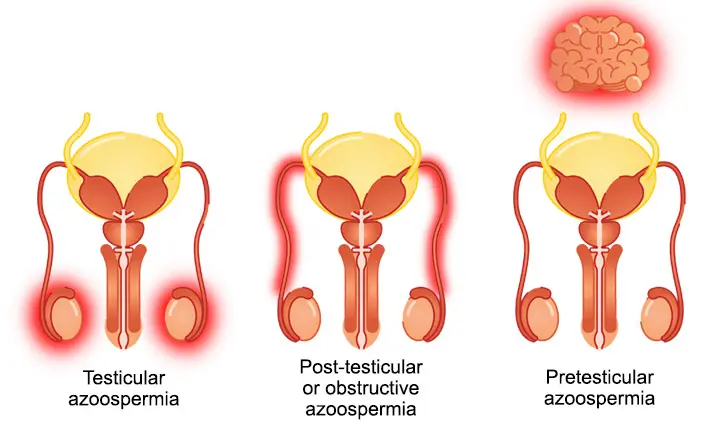What is infertility?
Infertility is generally determined as the inability to naturally conceive a child. If you've been trying to have a baby for over a year without success, your doctor might start talking to you about infertility.
How common is male infertility?
The World Health Organisation (WHO) believes that male infertility is largely underestimated, and that infertility in general affects a significant portion of the world's population.
There is a lack of accurate and consistent data across the globe, but scientists estimate that men account for around 20 – 30% of infertility cases, and contribute to around 50% of cases overall.
Common causes of male infertility
Here are some of the most common conditions affecting male fertility.
Low sperm count
Doctors consider anything below 15 million sperm per millilitre of semen as an abnormally low sperm count. A low sperm count is also referred to as oligospermia.
Low sperm count is diagnosed via semen analysis. If you're having trouble conceiving, it's likely your doctor will do a semen analysis to check for potential problems with your sperm.
A healthy number of sperm is necessary to give you the best chance of conceiving each month. The less sperm you have, the lower your chances of getting your partner pregnant.
Low sperm count can be caused by:
- Genetics
- Lifestyle and overall health
- Drug or alcohol abuse
- Sexually transmitted diseases (STDs)
- Surgery or trauma to the genitals
Azoospermia
Men with azoospermia have no sperm at all in their semen. This condition accounts for around 15% of all male infertility cases, and comes without any noticeable symptoms. Azoospermia will prevent you and your partner from conceiving naturally as there is no sperm present to fertilise your partner's egg.
There are a few types of azoospermia:
Testicular azoospermia, which prevents your testicles from making sperm. This could be due to injury or trauma, infection, childhood illness, cancer and cancer treatments, or inherited conditions such as Kilnefelter's syndrome.
Post-testicular or obstructive azoospermia, which occurs when your testicles produce sperm but they can't be released due to a blockage or surgery like a vasectomy. Retrograde ejaculation, where the semen goes into your bladder during ejaculation, can also cause this.
Pretesticular azoospermia, where your testicles are healthy but your body doesn’t signal them correctly to produce sperm. This could be due to a hormone imbalance or some cancer treatments, and is less common.
Erectile dysfunction
You may have healthy sperm and the ability to conceive, but if you are unable to successfully have sexual intercourse, you can't get your partner pregnant. Erectile dysfunction, the inability to get or maintain an erection, is a common problem for men and is often reversible.
Causes of erectile dysfunction:
- Hormone imbalances
- High blood pressure
- Narrowed arteries restricting blood flow
- Diseases affecting the nervous system
- Diabetes
- Injury or trauma
- Medication
- Lifestyle factors such as drinking, smoking, and drugs
- Stress or mental health issues
Other causes of male infertility
There are a myriad of other problems that could affect your chances of conceiving, including:
- Advanced age
- Poor sperm quality or mobility
- Sexually transmitted infections
- Birth defects
- Autoimmune disorders, where your body attacks your own sperm
- Varicoceles, which are enlarged varicose veins that can lead to azoospermia
- Steroid abuse
- Exposure to toxic or hazardous substances
- Prolonged or repeated exposure to high temperatures
Symptoms of male infertility
While there is no obvious indication of infertility beyond the inability to conceive, the underlying problems that lead to infertility may result in signs or symptoms such as:
- Problems with sexual function, such as reduced sexual desire, difficulty with ejaculation, or problems with maintaining an erection (erectile dysfunction)
- Pain in the testicle area
- Swelling or a lump in the testicles or surrounding area
- Abnormal breast growth (gynaecomastia)
- Decrease in facial or body hair, which may indicate chromosomal or hormonal abnormalities
- Low sperm count of less than 15 million sperm per millilitre of semen, or total sperm count of less than 39 million per ejaculate
- Recurring respiratory infections
- Inability to smell
Testing for male infertility
If your doctor suspects that you suffer from male infertility, some tests may be recommended to confirm the diagnosis. The following are common tests for male infertility:
Semen analysis
To collect semen, you may ejaculate into a container at the clinic or home. It is then sent to a lab for analysis. As sperm counts can vary significantly from one sample to the next, you may need to repeat the collection process over time to get accurate results.
Scrotal ultrasound
In a scrotal ultrasound, high-frequency soundwaves are used to produce images of your internal organs and structures. It can reveal problems like infection, cysts, fluid in the testicles, or tumours.
Transrectal ultrasound
In a transrectal ultrasound, a small, lubricated wand is inserted into your rectum to check the prostate and look for possible blockages in the tubes that carry semen.
Hormone testing
Imbalances in the male hormone testosterone, as well as other hormones that are important for man’s reproductive system to function well, can affect sperm production and contribute to infertility. Hormone testing via a blood test will be able to reveal if there might be a hormonal cause of infertility.
Post-ejaculation urinalysis
If sperm is present in your urine, this could mean that the sperm is travelling backward into the bladder, instead of being ejected out of your penis. This is known as retrograde ejaculation.
Genetic tests
In patients with extremely low concentration of sperm, it could be attributed to changes in the Y chromosome. A genetic test could help to reveal congenital or inherited syndromes.
Testicular biopsy
A needle is inserted into the testicles to collect samples for testing. If this shows that sperm production is normal, then the cause of infertility may be a blockage or other problem with sperm transport or delivery.
Anti-sperm antibodies test
Under normal circumstances, sperm does not come into contact with the rest of your body and is protected from the immune system. However, sometimes injury, surgery or prostate gland infection can interfere with this, causing your immune system to produce anti-sperm antibodies.
To check for this, a sample of sperm will be checked to see how much of the sperm is affected by antibodies. The higher the level of affected sperm, the lower the chance of sperm being able to fertilise an egg.
Specialised sperm function tests
Other tests can check how well your sperm survives after ejaculation, as well as its ability to penetrate and attach to an egg.
Treatment for male infertility
Treatment options will depend on the underlying cause of male infertility.
Treating low sperm count
- Surgery, if there is a potential obstruction or internal damage due to varicoceles
- Medication
- Antibiotics to treat any infections
- Hormone therapy
Diet and lifestyle changes are often the most effective way of improving your sperm count. Obesity can lead to a low sperm count, so if you're overweight focus on a healthy diet and exercise. Cut out alcohol, smoking and drugs. Wearing tight underwear may also affect your sperm count, so wear loose cotton boxers if you can.
Treating azoospermia
Treatment options for azoospermia are dependent on the type you have. It's important for your doctor to do a thorough investigation to find out the cause. You might be able to have surgery to remove a blockage, or sperm retrieval may also be possible if your body is producing sperm but it can't be released. Sperm retrieved by surgical methods can only be used in IVF (in vitro fertilisation).
Treating erectile dysfunction
Erectile dysfunction is often reversible with simple lifestyle changes like losing weight and lowering your blood pressure. There are also medications such as Viagra, injectable and suppositories that can help you get an erection. However, if you have an underlying illness like heart disease or diabetes, or even stress or anxiety, your doctor will focus on treating that and the secondary erectile dysfunction should improve.
What to do next
If you're struggling to conceive, visit your doctor or a fertility specialist. An initial exam and semen analysis may give an indication of what is going on. Further testing can be done from there if the problem isn’t clear-cut.
Fertility is a tricky issue and often a combination of factors from both the male and female side can lower your chances of getting pregnant. Sometimes infertility is simply unexplained, which is why sperm retrieval and IVF are so common. Staying as healthy as possible will give you the best chance of staying fertile, but if you're struggling, seek help. There are lots of options available for couples that need them.














